- Home
- H. P. Lovecraft
The Complete H.P. Lovecraft Collection (Xist Classics) Page 44
The Complete H.P. Lovecraft Collection (Xist Classics) Read online
Page 44
He acquired a habit of writing long documents of some sort, which he carefully sealed and filled with injunctions that I transmit them after his death to certain persons whom he named—for the most part lettered East Indians, but including a once celebrated French physician now generally thought dead, and about whom the most inconceivable things had been whispered. As it happened, I burned all these papers undelivered and unopened. His aspect and voice became utterly frightful, and his presence almost unbearable. One September day an unexpected glimpse of him induced an epileptic fit in a man who had come to repair his electric desk lamp; a fit for which he prescribed effectively whilst keeping himself well out of sight. That man, oddly enough, had been through the terrors of the Great War without having incurred any fright so thorough.
Then, in the middle of October, the horror of horrors came with stupefying suddenness. One night about eleven the pump of the refrigerating machine broke down, so that within three hours the process of ammonia cooling became impossible. Dr. Muñoz summoned me by thumping on the floor, and I worked desperately to repair the injury while my host cursed in a tone whose lifeless, rattling hollowness surpassed description. My amateur efforts, however, proved of no use; and when I had brought in a mechanic from a neighbouring all-night garage we learned that nothing could be done till morning, when a new piston would have to be obtained. The moribund hermit’s rage and fear, swelling to grotesque proportions, seemed likely to shatter what remained of his failing physique; and once a spasm caused him to clap his hands to his eyes and rush into the bathroom. He groped his way out with face tightly bandaged, and I never saw his eyes again.
The frigidity of the apartment was now sensibly diminishing, and at about 5 a.m. the doctor retired to the bathroom, commanding me to keep him supplied with all the ice I could obtain at all-night drug stores and cafeterias. As I would return from my sometimes discouraging trips and lay my spoils before the closed bathroom door, I could hear a restless splashing within, and a thick voice croaking out the order for “More—more!” At length a warm day broke, and the shops opened one by one. I asked Esteban either to help with the ice-fetching whilst I obtained the pump piston, or to order the piston while I continued with the ice; but instructed by his mother, he absolutely refused.
Finally I hired a seedy-looking loafer whom I encountered on the corner of Eighth Avenue to keep the patient supplied with ice from a little shop where I introduced him, and applied myself diligently to the task of finding a pump piston and engaging workmen competent to install it. The task seemed interminable, and I raged almost as violently as the hermit when I saw the hours slipping by in a breathless, foodless round of vain telephoning, and a hectic quest from place to place, hither and thither by subway and surface car. About noon I encountered a suitable supply house far downtown, and at approximately 1:30 p.m. arrived at my boarding-place with the necessary paraphernalia and two sturdy and intelligent mechanics. I had done all I could, and hoped I was in time.
Black terror, however, had preceded me. The house was in utter turmoil, and above the chatter of awed voices I heard a man praying in a deep basso. Fiendish things were in the air, and lodgers told over the beads of their rosaries as they caught the odour from beneath the doctor’s closed door. The lounger I had hired, it seems, had fled screaming and mad-eyed not long after his second delivery of ice; perhaps as a result of excessive curiosity. He could not, of course, have locked the door behind him; yet it was now fastened, presumably from the inside. There was no sound within save a nameless sort of slow, thick dripping.
Briefly consulting with Mrs. Herrero and the workmen despite a fear that gnawed my inmost soul, I advised the breaking down of the door; but the landlady found a way to turn the key from the outside with some wire device. We had previously opened the doors of all the other rooms on that hall, and flung all the windows to the very top. Now, noses protected by handkerchiefs, we tremblingly invaded the accursed south room which blazed with the warm sun of early afternoon.
A kind of dark, slimy trail led from the open bathroom door to the hall door, and thence to the desk, where a terrible little pool had accumulated. Something was scrawled there in pencil in an awful, blind hand on a piece of paper hideously smeared as though by the very claws that traced the hurried last words. Then the trail led to the couch and ended unutterably.
What was, or had been, on the couch I cannot and dare not say here. But this is what I shiveringly puzzled out on the stickily smeared paper before I drew a match and burned it to a crisp; what I puzzled out in terror as the landlady and two mechanics rushed frantically from that hellish place to babble their incoherent stories at the nearest police station. The nauseous words seemed well-nigh incredible in that yellow sunlight, with the clatter of cars and motor trucks ascending clamorously from crowded Fourteenth Street, yet I confess that I believed them then. Whether I believe them now I honestly do not know. There are things about which it is better not to speculate, and all that I can say is that I hate the smell of ammonia, and grow faint at a draught of unusually cool air.
“The end,” ran that noisome scrawl, “is here. No more ice—the man looked and ran away. Warmer every minute, and the tissues can’t last. I fancy you know—what I said about the will and the nerves and the preserved body after the organs ceased to work. It was good theory, but couldn’t keep up indefinitely. There was a gradual deterioration I had not foreseen. Dr. Torres knew, but the shock killed him. He couldn’t stand what he had to do—he had to get me in a strange, dark place when he minded my letter and nursed me back. And the organs never would work again. It had to be done my way—artificial preservation—for you see I died that time eighteen years ago.”
The Crawling Chaos
Of the pleasures and pains of opium much has been written. The ecstasies and horrors of De Quincey and the paradis artificiels of Baudelaire are preserved and interpreted with an art which makes them immortal, and the world knows well the beauty, the terror, and the mystery of those obscure realms into which the inspired dreamer is transported. But much as has been told, no man has yet dared intimate the nature of the phantasms thus unfolded to the mind, or hint at the direction of the unheard-of roads along whose ornate and exotic course the partaker of the drug is so irresistibly borne. De Quincey was drawn back into Asia, that teeming land of nebulous shadows whose hideous antiquity is so impressive that “the vast age of the race and name overpowers the sense of youth in the individual”, but farther than that he dared not go. Those who have gone farther seldom returned; and even when they have, they have been either silent or quite mad. I took opium but once—in the year of the plague, when doctors sought to deaden the agonies they could not cure. There was an overdose—my physician was worn out with horror and exertion—and I travelled very far indeed. In the end I returned and lived, but my nights are filled with strange memories, nor have I ever permitted a doctor to give me opium again.
The pain and pounding in my head had been quite unendurable when the drug was administered. Of the future I had no heed; to escape, whether by cure, unconsciousness, or death, was all that concerned me. I was partly delirious, so that it is hard to place the exact moment of transition, but I think the effect must have begun shortly before the pounding ceased to be painful. As I have said, there was an overdose; so my reactions were probably far from normal. The sensation of falling, curiously dissociated from the idea of gravity or direction, was paramount; though there was a subsidiary impression of unseen throngs in incalculable profusion, throngs of infinitely diverse nature, but all more or less related to me. Sometimes it seemed less as though I were falling, than as though the universe or the ages were falling past me. Suddenly my pain ceased, and I began to associate the pounding with an external rather than internal force. The falling had ceased also, giving place to a sensation of uneasy, temporary rest; and when I listened closely, I fancied the pounding was that of the vast, inscrutable sea as its sinister, colossal breakers lacerated some desolate shore after a storm of titan
ic magnitude. Then I opened my eyes.
For a moment my surroundings seemed confused, like a projected image hopelessly out of focus, but gradually I realised my solitary presence in a strange and beautiful room lighted by many windows. Of the exact nature of the apartment I could form no idea, for my thoughts were still far from settled; but I noticed vari-coloured rugs and draperies, elaborately fashioned tables, chairs, ottomans, and divans, and delicate vases and ornaments which conveyed a suggestion of the exotic without being actually alien. These things I noticed, yet they were not long uppermost in my mind. Slowly but inexorably crawling upon my consciousness, and rising above every other impression, came a dizzying fear of the unknown; a fear all the greater because I could not analyse it, and seeming to concern a stealthily approaching menace—not death, but some nameless, unheard-of thing inexpressibly more ghastly and abhorrent.
Presently I realised that the direct symbol and excitant of my fear was the hideous pounding whose incessant reverberations throbbed maddeningly against my exhausted brain. It seemed to come from a point outside and below the edifice in which I stood, and to associate itself with the most terrifying mental images. I felt that some horrible scene or object lurked beyond the silk-hung walls, and shrank from glancing through the arched, latticed windows that opened so bewilderingly on every hand. Perceiving shutters attached to these windows, I closed them all, averting my eyes from the exterior as I did so. Then, employing a flint and steel which I found on one of the small tables, I lit the many candles reposing about the walls in Arabesque sconces. The added sense of security brought by closed shutters and artificial light calmed my nerves to some degree, but I could not shut out the monotonous pounding. Now that I was calmer, the sound became as fascinating as it was fearful, and I felt a contradictory desire to seek out its source despite my still powerful shrinking. Opening a portiere at the side of the room nearest the pounding, I beheld a small and richly draped corridor ending in a carven door and large oriel window. To this window I was irresistibly drawn, though my ill-defined apprehensions seemed almost equally bent on holding me back. As I approached it I could see a chaotic whirl of waters in the distance. Then, as I attained it and glanced out on all sides, the stupendous picture of my surroundings burst upon me with full and devastating force.
I beheld such a sight as I had never beheld before, and which no living person can have seen save in the delirium of fever or the inferno of opium. The building stood on a narrow point of land—or what was now a narrow point of land—fully 300 feet above what must lately have been a seething vortex of mad waters. On either side of the house there fell a newly washed-out precipice of red earth, whilst ahead of me the hideous waves were still rolling in frightfully, eating away the land with ghastly monotony and deliberation. Out a mile or more there rose and fell menacing breakers at least fifty feet in height, and on the far horizon ghoulish black clouds of grotesque contour were resting and brooding like unwholesome vultures. The waves were dark and purplish, almost black, and clutched at the yielding red mud of the bank as if with uncouth, greedy hands. I could not but feel that some noxious marine mind had declared a war of extermination upon all the solid ground, perhaps abetted by the angry sky.
Recovering at length from the stupor into which this unnatural spectacle had thrown me, I realised that my actual physical danger was acute. Even whilst I gazed the bank had lost many feet, and it could not be long before the house would fall undermined into the awful pit of lashing waves. Accordingly I hastened to the opposite side of the edifice, and finding a door, emerged at once, locking it after me with a curious key which had hung inside. I now beheld more of the strange region about me, and marked a singular division which seemed to exist in the hostile ocean and firmament. On each side of the jutting promontory different conditions held sway. At my left as I faced inland was a gently heaving sea with great green waves rolling peacefully in under a brightly shining sun. Something about that sun’s nature and position made me shudder, but I could not then tell, and cannot tell now, what it was. At my right also was the sea, but it was blue, calm, and only gently undulating, while the sky above it was darker and the washed-out bank more nearly white than reddish.
I now turned my attention to the land, and found occasion for fresh surprise; for the vegetation resembled nothing I had ever seen or read about. It was apparently tropical or at least sub-tropical—a conclusion borne out by the intense heat of the air. Sometimes I thought I could trace strange analogies with the flora of my native land, fancying that the well-known plants and shrubs might assume such forms under a radical change of climate; but the gigantic and omnipresent palm trees were plainly foreign. The house I had just left was very small—hardly more than a cottage—but its material was evidently marble, and its architecture was weird and composite, involving a quaint fusion of Western and Eastern forms. At the corners were Corinthian columns, but the red tile roof was like that of a Chinese pagoda. From the door inland there stretched a path of singularly white sand, about four feet wide, and lined on either side with stately palms and unidentifiable flowering shrubs and plants. It lay toward the side of the promontory where the sea was blue and the bank rather whitish. Down this path I felt impelled to flee, as if pursued by some malignant spirit from the pounding ocean. At first it was slightly uphill, then I reached a gentle crest. Behind me I saw the scene I had left; the entire point with the cottage and the black water, with the green sea on one side and the blue sea on the other, and a curse unnamed and unnamable lowering over all. I never saw it again, and often wonder. . . . After this last look I strode ahead and surveyed the inland panorama before me.
The path, as I have intimated, ran along the right-hand shore as one went inland. Ahead and to the left I now viewed a magnificent valley comprising thousands of acres, and covered with a swaying growth of tropical grass higher than my head. Almost at the limit of vision was a colossal palm tree which seemed to fascinate and beckon me. By this time wonder and escape from the imperilled peninsula had largely dissipated my fear, but as I paused and sank fatigued to the path, idly digging with my hands into the warm, whitish-golden sand, a new and acute sense of danger seized me. Some terror in the swishing tall grass seemed added to that of the diabolically pounding sea, and I started up crying aloud and disjointedly, “Tiger? Tiger? Is it Tiger? Beast? Beast? Is it a Beast that I am afraid of?” My mind wandered back to an ancient and classical story of tigers which I had read; I strove to recall the author, but had difficulty. Then in the midst of my fear I remembered that the tale was by Rudyard Kipling; nor did the grotesqueness of deeming him an ancient author occur to me. I wished for the volume containing this story, and had almost started back toward the doomed cottage to procure it when my better sense and the lure of the palm prevented me.
Whether or not I could have resisted the backward beckoning without the counter-fascination of the vast palm tree, I do not know. This attraction was now dominant, and I left the path and crawled on hands and knees down the valley’s slope despite my fear of the grass and of the serpents it might contain. I resolved to fight for life and reason as long as possible against all menaces of sea or land, though I sometimes feared defeat as the maddening swish of the uncanny grasses joined the still audible and irritating pounding of the distant breakers. I would frequently pause and put my hands to my ears for relief, but could never quite shut out the detestable sound. It was, as it seemed to me, only after ages that I finally dragged myself to the beckoning palm tree and lay quiet beneath its protecting shade.
There now ensued a series of incidents which transported me to the opposite extremes of ecstasy and horror; incidents which I tremble to recall and dare not seek to interpret. No sooner had I crawled beneath the overhanging foliage of the palm, than there dropped from its branches a young child of such beauty as I never beheld before. Though ragged and dusty, this being bore the features of a faun or demigod, and seemed almost to diffuse a radiance in the dense shadow of the tree. It smiled and extended its ha
nd, but before I could arise and speak I heard in the upper air the exquisite melody of singing; notes high and low blent with a sublime and ethereal harmoniousness. The sun had by this time sunk below the horizon, and in the twilight I saw that an aureola of lambent light encircled the child’s head. Then in a tone of silver it addressed me: “It is the end. They have come down through the gloaming from the stars. Now all is over, and beyond the Arinurian streams we shall dwell blissfully in Teloe.” As the child spoke, I beheld a soft radiance through the leaves of the palm tree, and rising greeted a pair whom I knew to be the chief singers among those I had heard. A god and goddess they must have been, for such beauty is not mortal; and they took my hands, saying, “Come, child, you have heard the voices, and all is well. In Teloe beyond the Milky Way and the Arinurian streams are cities all of amber and chalcedony. And upon their domes of many facets glisten the images of strange and beautiful stars. Under the ivory bridges of Teloe flow rivers of liquid gold bearing pleasure-barges bound for blossomy Cytharion of the Seven Suns. And in Teloe and Cytharion abide only youth, beauty, and pleasure, nor are any sounds heard, save of laughter, song, and the lute. Only the gods dwell in Teloe of the golden rivers, but among them shalt thou dwell.”

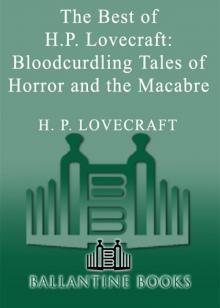 The Best of H.P. Lovecraft
The Best of H.P. Lovecraft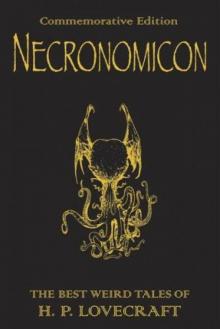 The Definitive H.P. Lovecraft: 67 Tales Of Horror In One Volume
The Definitive H.P. Lovecraft: 67 Tales Of Horror In One Volume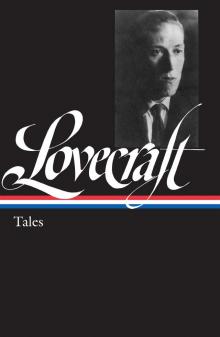 The Complete Works of H.P. Lovecraft
The Complete Works of H.P. Lovecraft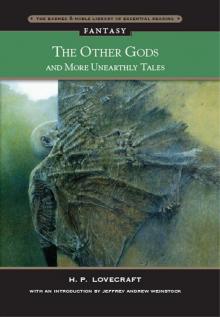 Other Gods and More Unearthly Tales
Other Gods and More Unearthly Tales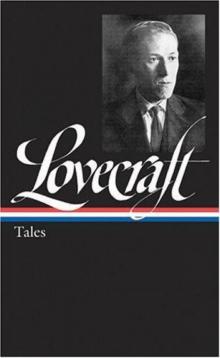 Lovecraft's Fiction Volume I, 1905-1925
Lovecraft's Fiction Volume I, 1905-1925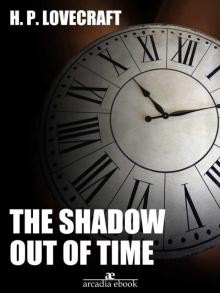 The Shadow Out of Time
The Shadow Out of Time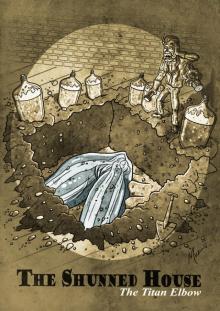 The Shunned House
The Shunned House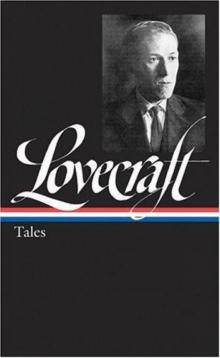 Lovecraft's Fiction Volume II, 1926-1928
Lovecraft's Fiction Volume II, 1926-1928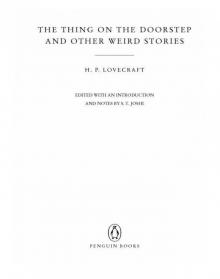 The Thing on the Doorstep and Other Weird Stories
The Thing on the Doorstep and Other Weird Stories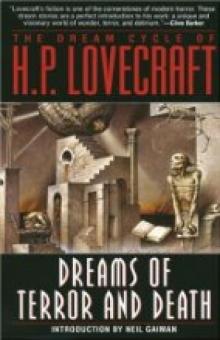 Dream Cycle of H. P. Lovecraft: Dreams of Terror and Death
Dream Cycle of H. P. Lovecraft: Dreams of Terror and Death Great Tales of Horror
Great Tales of Horror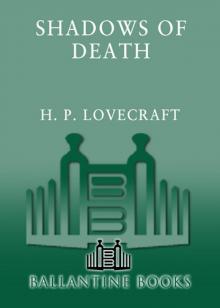 Shadows of Death
Shadows of Death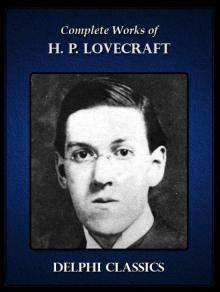 Delphi Complete Works of H. P. Lovecraft (Illustrated)
Delphi Complete Works of H. P. Lovecraft (Illustrated)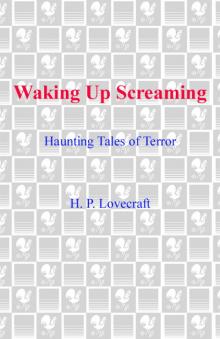 Waking Up Screaming: Haunting Tales of Terror
Waking Up Screaming: Haunting Tales of Terror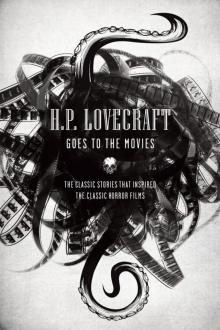 H.P. Lovecraft Goes to the Movies
H.P. Lovecraft Goes to the Movies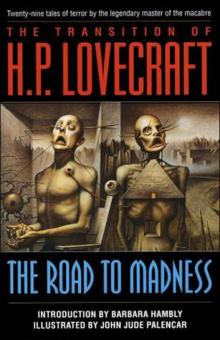 The Road to Madness
The Road to Madness The Complete H.P. Lovecraft Reader (68 Stories)
The Complete H.P. Lovecraft Reader (68 Stories)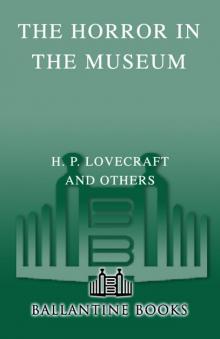 The Horror in the Museum
The Horror in the Museum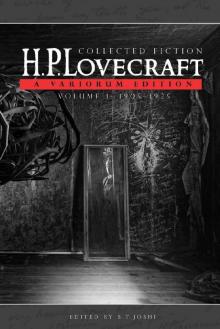 Collected Fiction Volume 1 (1905-1925): A Variorum Edition
Collected Fiction Volume 1 (1905-1925): A Variorum Edition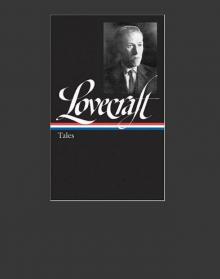 Lovecrafts_Fiction, vol.I_1905-1925
Lovecrafts_Fiction, vol.I_1905-1925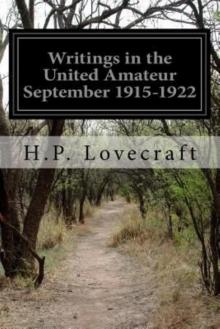 Writings in the United Amateur, 1915-1922
Writings in the United Amateur, 1915-1922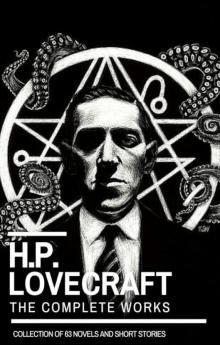 H.P. Lovecraft: The Complete Works
H.P. Lovecraft: The Complete Works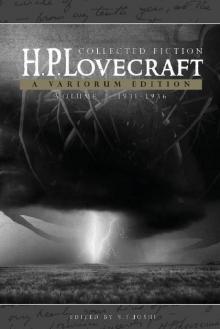 Collected Fiction Volume 3 (1931-1936): A Variorum Edition
Collected Fiction Volume 3 (1931-1936): A Variorum Edition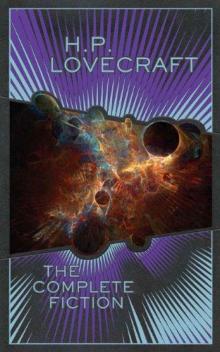 H.P. Lovecraft: The Complete Fiction
H.P. Lovecraft: The Complete Fiction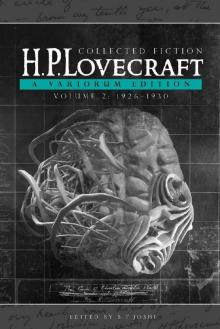 Collected Fiction Volume 2 (1926-1930): A Variorum Edition
Collected Fiction Volume 2 (1926-1930): A Variorum Edition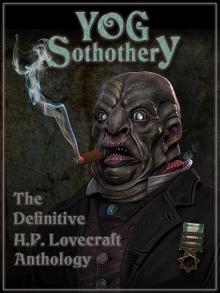 Yog Sothothery - The Definitive H.P. Lovecraft Anthology
Yog Sothothery - The Definitive H.P. Lovecraft Anthology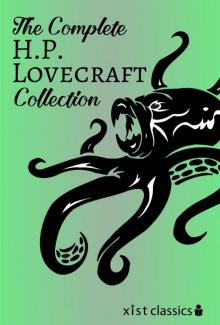 The Complete H.P. Lovecraft Collection (Xist Classics)
The Complete H.P. Lovecraft Collection (Xist Classics)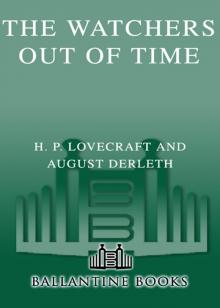 The Watchers Out of Time
The Watchers Out of Time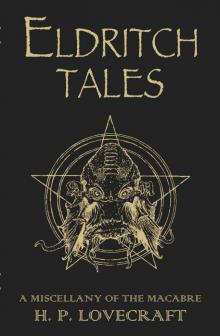 Eldritch Tales
Eldritch Tales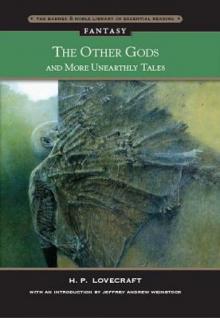 The Other Gods And More Unearthly Tales
The Other Gods And More Unearthly Tales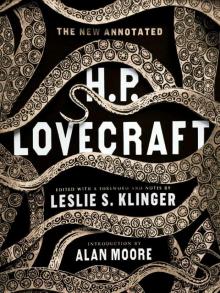 The New Annotated H. P. Lovecraft
The New Annotated H. P. Lovecraft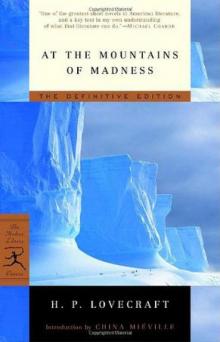 At the mountains of madness
At the mountains of madness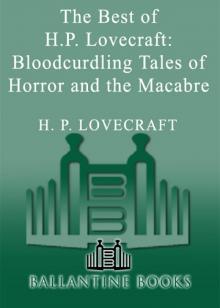 Bloodcurdling Tales of Horror and the Macabre
Bloodcurdling Tales of Horror and the Macabre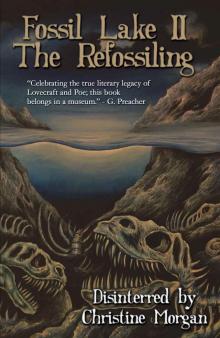 Fossil Lake II: The Refossiling
Fossil Lake II: The Refossiling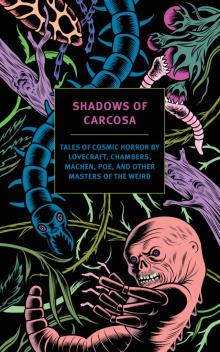 Shadows of Carcosa: Tales of Cosmic Horror by Lovecraft, Chambers, Machen, Poe, and Other Masters of the Weird
Shadows of Carcosa: Tales of Cosmic Horror by Lovecraft, Chambers, Machen, Poe, and Other Masters of the Weird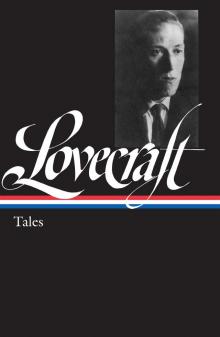 H. P. Lovecraft
H. P. Lovecraft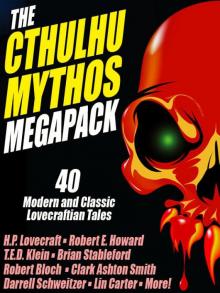 The Cthulhu Mythos Megapack
The Cthulhu Mythos Megapack The Complete H. P. Lovecraft Reader (2nd Edition)
The Complete H. P. Lovecraft Reader (2nd Edition)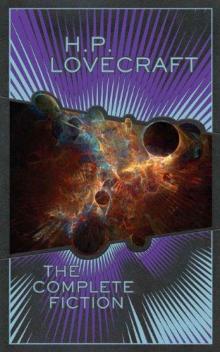 The Complete Fiction
The Complete Fiction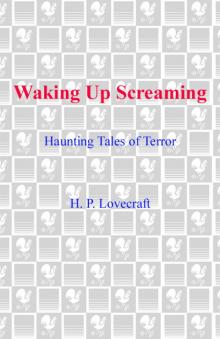 Waking Up Screaming
Waking Up Screaming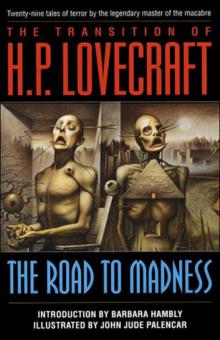 Transition of H. P. Lovecraft
Transition of H. P. Lovecraft![[1935] The Shadow Out of Time Read online](http://i1.bookreadfree.com/i2/04/12/1935_the_shadow_out_of_time_preview.jpg) [1935] The Shadow Out of Time
[1935] The Shadow Out of Time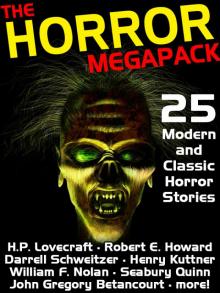 The Horror Megapack
The Horror Megapack